Recording Now Available of U.S.-Canada Collaborative Research Panel

A recording is now available of "Crossing the Borders of U.S. - Canada Collaborative Research", a panel discussion co-hosted by ARCUS and the Association of Canadian Universities for Northern Studies (ACUNS) at the 2021 ArcticNet Annual Scientific Meeting. The discussion was introduced by Jeanette Doucet (ACUNS), moderated by Diane Hirshberg (ARCUS Board Member) and featured remarks by Greg Poelzer (Fulbright Arctic Initiative), Mike Spindler (Northwest Boreal Partnership), Charleen Fisher (University of Alaska Fairbanks), & Gabrielle Slowey (York University). This session explored barriers and opportunities to bi-lateral research partnerships, while attempting to foster more cross-border collaborations across all disciplines.
Call for Arctic Research Articles

The editors of Witness the Arctic and Witness Community Highlights invite contributions of short articles on Arctic research projects including news about physical, social, and Indigenous Knowledge projects. Editors will work with contributors to develop multi-media components that could enhance outreach efforts of complex ideas.
For more information, contact Betsy Turner-Bogren (betsy [at] arcus.org).
SIPN2 Presentation to AGU 2021
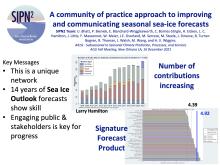
During the 2021 American Geophysical Union Fall Meetings in New Orleans, Louisiana; Uma Bhatt, SIPN2 Lead Project Principal Investigator, presented a talk entitled "A Community of Practice Approach to Improving and Communicating Seasonal Sea-Ice Forecasts." Her presentation was developed with input from, and on behalf of, the SIPN2 Project Team. A PDF of her five-minute presentation slides is available here.
Happy Holidays from ARCUS!

On behalf of all of us here at the Arctic Research Consortium of the U.S., Happy Holidays! As we near the end of the year, we also invite you join us in reflecting on and celebrating some of the highlights and achievements of 2021 by exploring the 2021 ARCUS Annual Report.
Witness Community Highlights

The December 2021 issue of Witness Community Highlights is now available online. This issue includes one article, "ARCUS Member Highlights from the 2021 Annual Meeting" that features updates from several ARCUS members shared during the meeting held on 4 November 2021. The virtual event provided opportunities for participants to share what they and their organizations are doing to address key challenges and opportunities in Arctic research.
For questions, or to suggest topics for future articles, please contact Betsy Turner-Bogren, ARCUS (betsy [at] arcus.org).
Web Resources for the American Geophysical Union Fall Meeting

ARCUS announces our ARCUS at AGU, Indigenous Knowledge at AGU, and the Arctic Sessions webpages for this year’s American Geophysical Union (AGU) Fall Meeting. The Fall Meeting will be held 13-17 December 2021 in New Orleans, Louisiana and online.
ARCUS has compiled a list of Arctic-relevant happenings, Arctic Indigenous/Traditional Knowledge and co-production presentations, and ARCUS-related events to help attendees of the AGU Fall Meeting 2021 find Arctic-related town halls, talks, posters, and other events.
If there is a session or town hall missing that you would like listed, please contact Lisa Sheffield Guy, ARCUS, at lisa [at] arcus.org
Fall 2021 Issue of Witness the Arctic
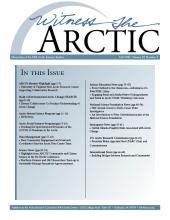
This issue includes news about the NSF Polar Cyberinfrastructure Program, recent grants awarded to Early-Career Polar Investigators, and two NSF-funded research projects: a RAPID-funded study of the spatiotemporal dynamics of the COVID-19 pandemic in the Arctic and an NNA-funded study of interactions and feedbacks within permafrost-agroecosystems. This issue also includes summary news from the Engaging Rural and Alaska Native Undergraduates and Youth in Arctic STEM workshop and the Community and Citizen Science in the Far North conference; updates from the US Arctic Research Commission, the Arctic Data Center, the SEARCH program, SIPN2, and the International Arctic Hub; an overview of the “Climate-Fragility Risk Brief: The Arctic”; a PolarTREC alum’s reflections on how sharing his research experiences with students impacts their interest in science; and a highlight of ARCUS member institution, University of Virginia’s, new Arctic Research Center.
Call for ARCUS Board Nominations
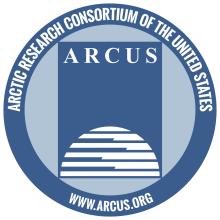
ARCUS announces a call for nominations for our December 2021 Board of Directors election! We seek nominations of candidates with enthusiasm and time to dedicate to ARCUS, who are willing and able to help ARCUS fulfill its mission. Terms will be three years and begin in January 2022. Nominees are welcome from any career level and type of organization and we strive to embody our value of “Diversity, Equity, Inclusion, and Belonging” in our Board. The nomination submission deadline is Monday, 29 November 2021, 12:00 p.m. AKST.
Community and Citizen Science in the Far North Webinar
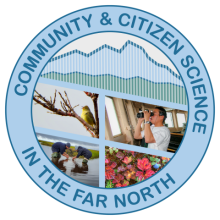
Join us for an informal webinar focusing on Community & Citizen Science in the Far North on Tuesday, 30 November 2021 at 9:00 a.m.–10:30 a.m. AKST.
This will be an opportunity to continue the discussions and networking after the recent Community and Citizen Science in the Far North conference that took place online 5–7 October 2021.
Registration is required for this webinar, which is free and open to the public.
Research Collaboration Across the U.S.-Canada Border

The Arctic Research Consortium of the U.S. (ARCUS) and the Association of Canadian Universities for Northern Studies (ACUNS) will co-host two panel discussions in the coming months focused on conducting research across the the U.S.-Canada border. The first panel will take place at the ACUNS Student Conference on Northern Studies on Wednesday, 3 November from 4-5:30p.m. ET. The second will occur as part of the ArcticNet Annual Scientific Meeting from 1:30-2:45 p.m. ET on Thursday, 9 December. Both events will explore projects and perspectives from researchers involved in community-engaged research that spans the U.S.-Canada border. For more information, or to register to attend, please visit the ACUNS and ArcticNet conference websites.
Witness Community Highlights

The October 2021 issue of Witness Community Highlights is now available online. This issue features three articles: Investing in Inuit Futures, highlighting a project that supports Inuit and Inuvialuit to become leaders within their communities in all areas of the arts; Planning Grants Awarded by NSF's Navigating the New Arctic Program, a summary of recent awards supporting efforts of teams from disparate disciplines and communities to tackle projects of larger scope in the future; and Jennifer Mercer Appointed as Section Head for the Arctic Sciences Section, NSF Office of Polar Programs, news effective 25 October 2021 with highlights of Dr. Mercer’s broad scientific background.
For questions, or to suggest topics for future articles, please contact Betsy Turner-Bogren, ARCUS (betsy [at] arcus.org).
ARCUS Research Seminar with Vladimir Romanovsky

ARCUS invites registration for the next Arctic Research Seminar featuring Vladimir Romanovsky, a Professor Emeritus in Geophysics at the Geophysical Institute and the Department of Geosciences, University of Alaska Fairbanks; and head of the Geophysical Institute Permafrost Laboratory. Dr. Romanovsky’s presentation, titled “Planning and Implementing the Thermal State of Permafrost Monitoring System in Alaska,” will be held via Zoom on Thursday, 28 October 2021 at 9:00 a.m. AKDT (1:00 p.m. EDT). Registration is required for this event.
ARCUS Annual Meeting
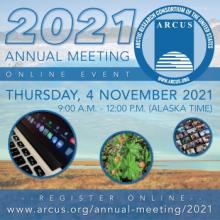
Registration is open for the 2021 ARCUS Annual Meeting! Our Annual Meeting will take place virtually on 4 November 2021, and is an important opportunity for ARCUS' Members, Board of Directors, staff, and other members of the Arctic research community to informally meet, talk, and connect with one another around key Arctic research and education issues.
Workshop Report on Engaging Rural and Alaska Native Undergraduates and Youth in Arctic STEM

The workshop report on Engaging Rural and Alaska Native Undergraduates and Youth in Arctic STEM is now available for download.
The report is a product of the Engaging Rural and Alaska Native Undergraduates and Youth in Arctic STEM workshop that was held from April 13–15, 2021. The goal of the workshop was to bring together rural and Alaska Native undergraduates and youth, federal agency representatives, researchers on Arctic STEM projects, Indigenous faculty and staff, those from the private sector, and rural Alaska community members to discuss the gaps, challenges, opportunities, and successful practices to increase and support the representation of rural and Alaska Native undergraduates and youth in STEM education and career pathways.
The workshop was an initiative of the IARPC Arctic STEM Education Working Group and was hosted by the Arctic Research Consortium of the U.S. (ARCUS) with funding from the National Science Foundation (NSF PLR 1304316 and PLR 1928794).
Call for SIPN2 Webinar Registration
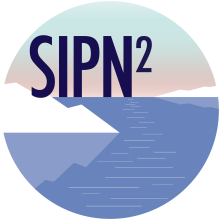
The Sea Ice Prediction Network-Phase 2 (SIPN2) announces a call for registration for the upcoming webinar and discussion 2021 Sea Ice Outlook Post-Season Review. This 90-minute webinar will be held on Monday, 11 October from 9:00 am to 10:30 am (Alaska Daylight Time/ UTC−08:00). The webinar will provide a post-season review and discussion of the 2021 Sea Ice Outlook (SIO) and lessons learned. Registration is required and free of charge.
ARCUS Research Seminar with Kirsi Latola
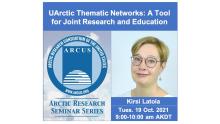
Please join the Arctic Research Consortium of the U.S. (ARCUS) for an upcoming webinar with Dr. Kirsi Latola, UArctic’s Vice-President of Networks, titled "UArctic Thematic Networks: A Tool for Joint Research and Education". The webinar will be held via Zoom on Tuesday, 19 October 2021 at 9:00 a.m. AKDT (1:00 p.m. EDT/5:00 p.m. GMT). Registration is required for this event.
Witness Community Highlights

The September 2021 issue of Witness Community Highlights is now available online. This issue features two articles, "NSF's Navigating the New Arctic Program: Recently Funded Projects" that includes summaries excerpted from the abstracts of the 17 individual and collaborative projects recently funded, and "Interview with ARCUS Member Sasha Liedman". This interview and the complementary Member Profile are the first in a new series developed to help ARCUS members get to know one another by supporting connections across disciplines, communities, and career paths.
For questions, or future article suggestions, please contact Betsy Turner-Bogren (betsy [at] arcus.org).
SEARCH Announces Formation of New Co-Production Teams

SEARCH announces a new phase of research focusing on co-producing understanding of Arctic environmental change and a call for nominations. Co-production teams—each comprising scientific, Indigenous, and decision-making experts—will co-produce syntheses of the drivers and consequences of environmental change in the Arctic and make that understanding accessible to diverse decision makers. The teams and their co-chairs will include:
- Processes and Consequences of Arctic Environmental Change
Co-chairs: Vera Kingeekuk Metcalf and Marika Holland - Human-well Being in the Changing Arctic Environment
Co-chairs: Jackie Qatalina Schaeffer and Elizabeth Marino - Geopolitical and Economic Stability in the Changing Arctic Environment
Co-chairs: Francis Wiese and Evan Bloom
Each team—comprising scientific, Indigenous, and decision-making experts—will co-produce syntheses of the drivers and consequences of environmental change in the Arctic.
To nominate co-production teams members (self nominations accepted), please contact:
Athena Copenhaver (aecopenhaver [at] alaska.edu)
Assistant Director
Study of Environmental Arctic Change
Review of applications will begin on 1 November and announcement of team members is expected in mid November.
Webinar: “Co-producing understanding of drivers and consequences of Arctic change”
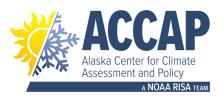
Webinar date: Oct. 5, 2021 @ 10:00 am AKDT - The rapid pace of environmental change in the Arctic demands timely and well-informed policy responses. SEARCH is beginning a new phase in which we are facilitating co-produced syntheses across disciplines and knowledge systems. We will make those syntheses available in formats tailored to diverse decision makers. In this webinar, we will introduce our team leaders, describe our approach, and seek participation of Indigenous, scientific, and decision-making experts.
SEARCH’s Arctic Answers published in Arctic, Antarctic, and Alpine Research
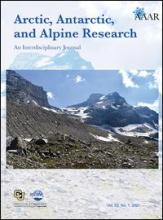
To promote an understanding of the science underlying climate change impacts in the Arctic, CU Boulder’s journal Arctic, Antarctic, and Alpine Research (AAAR) is teaming up with SEARCH, the Study of Environmental Arctic Change, to release a series of short articles called “Arctic Answers.”
Arctic Answers are brief summaries developed to “provide expert and broadly accessible answers to specific questions about the changing Arctic environment” according to Brendan Kelly, Chief Scientist and Executive Director of SEARCH at the University of Alaska Fairbanks. The first Arctic Answers will appear in the journal starting in September 2021.
2021 September Sea Ice Outlook Report is Now Available Online

The 2021 September Sea Ice Outlook (SIO) report is now available online. The Sea Ice Outlook, managed by the Sea Ice Prediction Network–Phase 2 (SIPN2), provides an open process for those interested in Arctic sea ice to share predictions and ideas. The monthly reports contain a variety of perspectives—from advanced numerical models to qualitative perspectives from citizen scientists. The Outlook is not an operational forecast.
This September Sea Ice Outlook (SIO) report—a new addition to the SIO season—was created in response to suggestions made during the 2021 January SIO Contributors Forum to solicit forecasts initialized in late August or early September for September mean Arctic sea-ice extent. The September SIO report provides a brief summary of the forecasts. The more comprehensive, full post-season report will be published in spring 2022.
For the pan-Arctic, the median September Outlook is 4.39 million square kilometers, equal to the August median and higher than the median of the June and July forecasts for 2021.
PolarTREC Alumna in Space
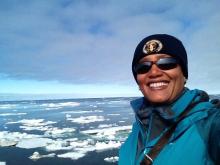
PolarTREC alumna Dr. Sian Proctor has been seeking educational adventures even before her 2014 expedition in Utqiaġvik, Alaska (Historical Ecology for Risk Management 2014), and now she is in space! Sian is one of four civilians aboard a SpaceX Crew Dragon capsule for the Inspiration4 mission that lifted off to space to orbit the earth for the next three days. While aboard the Crew Dragon, she is making history as one of the first-ever Black female spacecraft pilots. Read about what Sian did on her earthly expedition!
Witness Community Highlights

The August 2021 issue of Witness Community Highlights is now available online. This issue features two articles, "Accelerated Sea Ice Loss in the Wandel Sea Points to a Change in the Arctic’s Last Ice Area" and "Ethnography of and during the Pandemic Era in Alaska."
For questions, or future article suggestions, please contact Betsy Turner-Bogren (betsy [at] arcus.org).
PolarTREC Teacher Heads to the Arctic
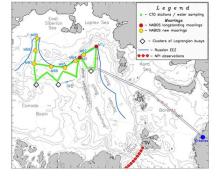
PolarTREC has a teacher heading to the Arctic! Jon Pazol, from West Leyden High School in Illinois is participating in an international ship-based research expedition, Nansen and Amundsen Basins Observational System (NABOS). Jon will be at sea until late October. You can read about his experience through his journals, view photos, and ask questions.
2021 August Sea Ice Outlook Report is Now Available Online
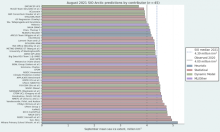
The 2021 August Sea Ice Outlook (SIO) report is now available online. The Sea Ice Outlook, managed by the Sea Ice Prediction Network–Phase 2 (SIPN2), provides an open process for those interested in Arctic sea ice to share predictions and ideas. The monthly reports contain a variety of perspectives—from advanced numerical models to qualitative perspectives from citizen scientists. The Outlook is not an operational forecast.
For the 2021 August report, 45 contributions were received that included pan-Arctic predictions. Of those contributions, nine also included predictions for pan-Antarctic, nine included predictions for the Alaska Region, and 15 submitted September mean sea-ice extent anomalies. This report includes discussions on current conditions in the Arctic; ocean heat conditions; predictions of Arctic sea-ice probability, ice-free dates, ice-advance dates, and initial conditions for those forecasts; Arctic regional sea-ice extent; Arctic sea-ice extent anomalies; and Antarctic contributions.
For the pan-Arctic, the median August Outlook value for September 2021 sea-ice extent is 4.39 million square kilometers, with quartiles of 4.1 and 4.5 million square kilometers. The forecasts continue to support a September 2021 mean sea-ice extent that is well above the September 2020 value of 4.00 million square kilometers.
